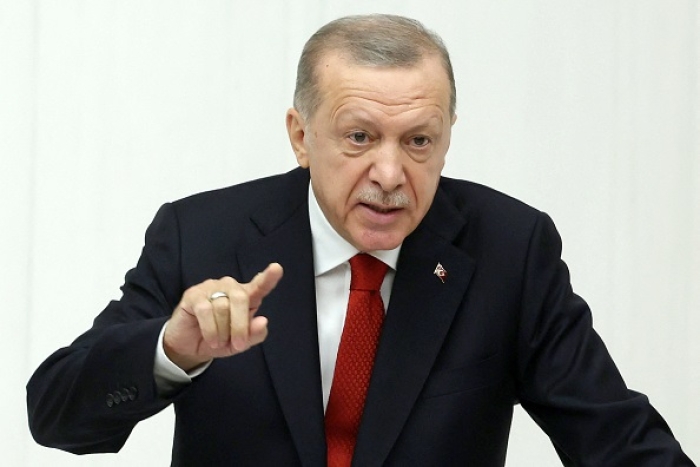
Berlin (CNSNews.com) – Turkey has slammed Sweden’s refusal to extradite a Turkish journalist wanted by Ankara, once again threatening to derail the Nordic country’s entry into NATO.
The incident comes at a time when Turkish President Recep Tayyip Erdogan has also raised the temperature in the longstanding rivalry with neighbor and fellow NATO ally Greece, to the dismay of the United States.
Sweden’s Supreme Court on Monday blocked a Turkish extradition request for Bulent Kenes, who denies Turkey’s claims that he was linked to a failed coup attempt in 2016.
The court cited the risk of “persecution based on this person’s political beliefs” for “so-called political crimes.”
Turkish Foreign Minister Mevlut Cavusoglu told reporters that the court decision was “a very negative development.”
Kenes fled to Sweden after Turkish authorities during a massive post-coup crackdown shut down the newspaper he edited, Zaman, which was critical of Erdogan and his Justice and Development Party (AKP).
Earlier this year Sweden and Finland, prompted by Russia’s invasion of Ukraine, ended decades of non-alignment and applied to join NATO. Entry into the alliance requires the approval of all existing allies, and Erdogan tied his endorsement to the two aspirants meeting specified conditions.
They included agreeing not to support the Kurdistan Workers’ Party (PKK) and its Syria-based affiliate the Kurdish Democratic Union (PYD), or the movement of the U.S.-based Turkish cleric, Fethullah Gulen, which Ankara has labeled the Fethullah Gulen Terrorist Organization (FETO).
Turkey also demanded that Sweden and Finland agree “to address pending deportation or extradition requests of terror suspects.”
Turkey is particularly interested in Sweden because of its large Kurdish diaspora, around 100,000-strong. Erdogan singled out Kenes specifically as a FETO supporter, saying his extradition was “crucial.”
Sweden has so far agreed to extradite four unnamed individuals, but Cavusoglu said that was an “unrealistic” response if it is to win Turkey’s approval to join NATO.
“We no longer want to hear good words from Sweden and Finland, we want to see concrete steps,” he said.
The Swedish government has stated that Sweden’s courts are independent and make their own determination on extradition applications.
Swedish Foreign Minister Tobias Billström, who is due to meet Cavusoglu in Turkey on Thursday, was quoted by the Andalou state news agency as saying he saw no reason to speculate on whether the judicial decision would affect the NATO process.
“The most important message we take to Ankara is to strengthen our efforts in the fight against the terrorist organization PKK through new laws,” he said. “When Sweden and Finland become [NATO] members, both NATO and Turkey will feel more secure.”
Every other NATO ally except Hungary has ratified entry for Sweden and Finland. Hungarian Prime Minister Viktor Orbán said last month said his country would support their NATO membership.
Aegean tensions
Turkey is also locked in a row with Greece, condemning what it calls “harassment” by Greek aircraft interfering with a NATO training mission conducted by Turkey last weekend in international airspace over the Aegean Sea.
“F-16s took off from five different air bases belonging to Greece and harassed our planes by placing radar locks,” Turkey’s Defense Ministry said on Tuesday, adding that Turkish F-16s had scrambled and “responded to the Greek planes.”
The Greek news service Naftemporiki cited defense ministry sources as saying that the Turkish planes passed over Greek airspace over the isle of Farmakonissi at 26,000 feet, and posed a risk of an accident, since they flew at an altitude used by civilian aircraft in the region.
On Wednesday, the ministry reported more Turkish F-16 overflights over Greek islands in the eastern Aegean, at heights ranging from 26,000 -29,000 feet. A Turkish drone also flew over one of the islands, it said.
Cavusoglu warned on Tuesday that if Greece continued “militarizing” the Aegean, Turkey would “suddenly arrive overnight,” echoing earlier threats made by the Erdogan, inferring that Turkey could launch a military operation.
The U.S. expressed concern between the escalation between the NATO members, while welcoming recent dialogue between the two.
“This is a time when we need unity and cohesion between our allies, certainly between and among our NATO allies,” State Department spokesman Ned Price said on Tuesday. “We always regret the escalation of provocative statements.”
“The tensions within an alliance between two alliance members certainly do not help anyone,” he said.
Price said the administration welcomed a recent meeting in Brussels on Monday between an advisor to Greek Prime Minister Kyriakos Mitsotakis and Erdogan’s senior advisor. No details of the meetings have been released.
Two weeks ago, Erdogan warned Greece that Turkish missiles were capable of hitting Athens.
Tensions between the historical rivals have risen over a laundry list of disputes, including competing claims over their continental shelves, maritime boundaries, energy, the alleged militarization of the Aegean islands, and wrangling over Cyprus, the northern section of which has been controlled by Turkish proxies since 1974.
